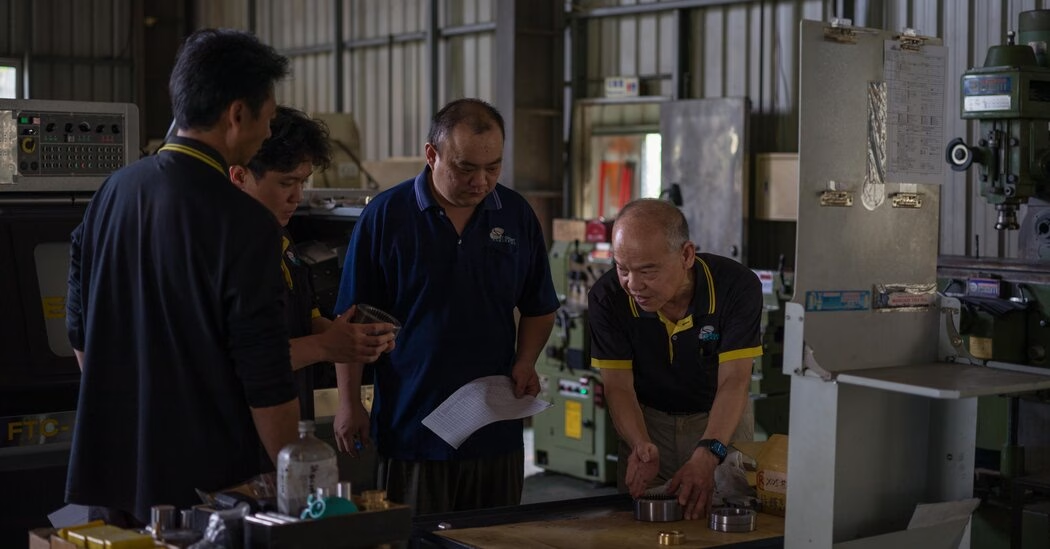Alex Tang, the owner of a lathe-making factory in central Taiwan, has been conducting morning pep talks for his workers, preparing them for the challenging times ahead. His business, along with other export-dependent manufacturers in Taiwan, could be significantly impacted by President Trump’s wave of global tariffs.
The 90-day pause on most tariffs provided some temporary relief for Taiwan and the rest of the world. Although Taiwan faces a 10 percent tariff on many of its products, it is less than the 32 percent tariff threatened by Mr. Trump. China, Taiwan’s manufacturing rival and potential ruler, has been hit with much higher tariffs of 145 percent, which could present both challenges and opportunities for Taiwan’s exporters.
Taiwan must remain flexible and agile in dealing with this new era of global trade disruption. One possibility is that Mr. Trump could raise tariffs again. Aegis CNC, Mr. Tang’s business, does not export directly to the United States, but many of its precision manufacturing tools, used by factories in Taiwan and Southeast Asia, do export to the United States.
Other business owners in central Taiwan, known as the island’s manufacturing heartland, share similar sentiments. They face the cost of the tariffs along with uncertainty, and they also worry about competition from Chinese exporters who may seek new customers due to being priced out of the U.S. market by tariffs.
Taiwan is renowned for its semiconductor plants that produce the world’s most advanced chips, which were spared from Mr. Trump’s tariffs due to their importance to U.S. tech companies. However, Taiwan also produces many consumer goods stocking American stores, including bicycles, car parts, kitchen appliances, stationery, and even lacrosse sticks. Taiwan also manufactures many factory-floor machines used to create these products in Taiwan or other parts of Asia.
The majority of Taiwanese manufacturers are small and medium-sized businesses, like Mr. Tang’s company, Aegis CNC. They produce precision lathes that cut, grind, and drill various materials into product parts.
Taiwanese companies have thrived by remaining small and cost-efficient, often relying on debt-free operations. Unlike businesses in mainland China, many Taiwanese manufacturers have not scaled up their operations. In addition to Mr. Trump’s tariffs, other recent challenges have included the COVID crisis, Europe’s faltering growth (especially after Russia’s invasion of Ukraine), and the surge in exports from China.
Some Taiwanese manufacturers can cope with Mr. Trump’s 10 percent tariff on Taiwan, and some predict opportunities as American importers seek alternatives to China. However, many worry about how uncertainty and broader price pressures caused by Mr. Trump’s tariffs could decrease orders beyond the United States.
Catherine Yen, a sales manager for Aegis CNC, describes the trade disruptions as a typhoon. The immediate impact on exports to the United States is the eye of the typhoon, but the wider effects on upstream and downstream connections are a concern. Henry Yang, a Taiwanese exporter of plumbing products, sympathizes with Mr. Trump’s goal of reviving American manufacturing but questions the impact of the tariffs.
Taiwan’s small and medium-sized manufacturing firms have defied expectations and adapted to challenges. Their flexibility, networks, and customer relationships have contributed to their competitiveness. These firms often provide specific manufacturing solutions tailored to the needs of individual customers. Taiwan has approximately 144,000 small and medium-sized businesses in the manufacturing sector, employing around two million workers. They account for 12 percent of the island’s manufactured exports, although their real contribution may be masked since they often supply parts to larger Taiwanese exporters.
Taiwanese manufacturers with markets in Europe and other regions worry about Chinese competitors who might attempt to undercut them, possibly aided by state subsidies. Some companies like Astro Tech, which produces high-end e-bikes and bike frames, see the tariffs as an opportunity to enter the U.S. market. Inquiries from potential U.S. customers are growing, and some Taiwanese manufacturers have already established relationships with U.S. customers even before Mr. Trump’s election.
Source: https://www.nytimes.com/2025/04/12/world/asia/taiwan-exporters-tariffs.html




